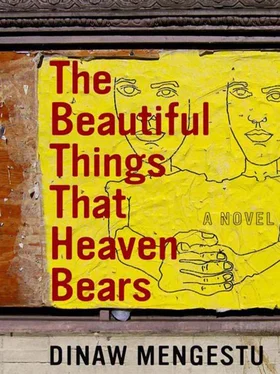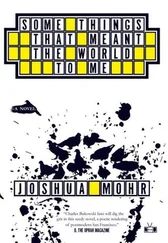As I walked up P Street, toward Georgetown Mall, I was aware of the light spring in my step. It wasn’t going to snow as I had hoped, but that was all right. I was enjoying the brightness of the day for what it was worth. It added a touch of warmth to the air: a crisp, fresh winter air perfectly suited to a brisk walk. There were crowds and traffic the entire way. I could keep pace with the G2 bus, which every few feet was forced to a grinding halt by a passenger or traffic light. I could make out the faces of every person in every car. None of them were going to arrive at any destination soon. They were going to be late for their dinners and their meetings. If I could have, I would have told each of them that it was okay. There was nothing to be done. This was the way the world worked. Some days you floated through, others you merely had to endure. P Street. Poor, narrow P Street. It was stretched to the point of breaking today. Even the sidewalks were crowded. People were spilling out of every store the street offered. Madame X’s bookstore had a line at the register. The grocery store was being robbed of its carts by people who refused to carry their bags of food home. It’s not often you have this vision of your world. Once, maybe twice a year, you see it only for its sheer, simple beauty. For a few blocks at least, I knew almost every person I passed. Familiar faces, all of them. This was one of time’s quieter tricks. It slowly, but surely, sheered off the unfamiliar edges of your life. A couple of people said hello to me as we passed on the sidewalk. Most, however, walked quickly past without ever meeting my eyes. That was okay, though. They wouldn’t have recognized that they were looking at a new man.
By the time I reached the stores of Georgetown, I had finished making a mental list of what I was going to buy for everyone. For my mother, a bottle of perfume. If she hadn’t changed too much, she still had at least a dozen bottles lined up on her dresser like toy soldiers, and was still searching for the perfect one. I was going to find it. For Dawit, a crisp button-down white shirt. He was a university graduate now. He had, as our father would have said, to play the part right. The last photograph of him that I had seen came in the mail last year. He had the same build as our father. He already looked more like him than I ever would. It was as if nature had split our features in half so that I would grow up to inherit my mother’s high cheekbones and petite nose, while he would have the bolder and stronger features of our father. He had a full, solid head, with the same thick, wavy black hair that my father had said made him a favorite of all the women. Whereas my chin rounded off delicately at the bottom, Dawit’s was defined by clear, hard lines. I hoped that his chin would serve him well later in life. For our father, it had ensured a certain level of respect from people who might have otherwise tried to take advantage of his soft demeanor. I wondered if Dawit was as gentle as our father was. There was something to his eyes that suggested he had the potential to be. I wondered if he would whisper as our father did when he was angry, or if he would become the type of man whose eyes would well up with tears whenever he was overcome with emotion. Our father loved white shirts. His closet was full of them. If they were still there, then Dawit could add this one to the collection, and if they were gone, then I hoped he would consider starting his own.
For Judith, a book. Something rare and remarkable. It would have to be historical. It would have to be about America and politics, and it would have to have at least a touch of poetry to it. After our first dinner together, I had searched for her name at the local library and then again at the Library of Congress. Judith McMasterson. Author of one book, America’s Repudiation of the Past , and several dozen scholarly arguments that had titles such as “Tocqueville’s Legacy on American Poetics,” “Writing Against History,” “Nineteenth-Century American Writers Search for Place,” “Silencing America’s Poets,” “The Grammar of Poetic History.” I read fragments from each one, including several chapters from her book. She was a harsh, passion-filled academic. She often wrote in the first person. She filled her arguments in with personal narratives and opinions. There was something even slightly pompous to her arguments, as if what she really wanted to say about American history through the course of all those pages was, “None of this is good enough.” She had a fierce loyalty to Emerson, and to the nineteenth century in general. My favorite passage was at the end of the book. After four hundred pages of dissecting Emerson’s essays and Democracy in America , Judith dedicated her closing chapter to an obscure French author, Gustave de Beaumont, whose greatest public legacy was as Tocqueville’s literary executor.
Beaumont never achieved the fame and recognition of his longtime friend Tocqueville. He published only one novel to be translated into English,
Marie, or Slavery in America
There is a fragmentary, discursive quality to the narrative that to my mind seems more fitting of the American literary spirit than anything captured by Tocqueville. Beaumont may not have even known just how radical his narrative was. The central questions of racial identity and women’s role in society lie at the heart of Beaumont’s troubled novel, as if he had divined the next one hundred years of America’s future and written this book as an explanation to those who would someday dare ask, “How did we end up here?” History, all too sadly, often works that way. The first creative spirits of a generation are often forgotten, or neglected by time.
Since meeting Judith I had read Democracy in America , a collection of Emerson’s essays, and even Marie , a novel I had to search through three libraries to find. I can’t say that I understood America any better for having done so. What I did understand was just how seriously Judith took all of America’s failures, and just how much she loved its heroes. She may not have said it, but I think a few thousand lines of poetry and a handful of novels redeemed the entire country for her.
Inside an old used-book store in Georgetown, I found a 1928 edition of Emily Dickinson’s collected poems. Buying the book meant skipping out on that month’s gas and electric bills and crossing my fingers and hoping for a steady flow of business through the rest of the winter. But it was a beautiful book. A hard red cover, and a spine that had held up perfectly over all these years. It had only a fraction of the poems found in a modern collection of Dickinson’s poetry, but that seemed all the better. Each poem had its own page, a few of which were dog-eared and lightly written on. I didn’t think I could have done any better.
I saved Naomi’s present for last. It was going to be a journal. I knew that from the start. I wanted it to be a grown-up journal, the kind that came with nice unlined pages and a hard leather cover that would fade and soften with time. I imagined it would be the type of journal that would carry her through adolescence and straight into adulthood. She would guard it zealously. She would carry it from home to home, hide it under her bed, and carry it in her book bag whenever she knew she was going to be away from home for more than a night. I didn’t know how to tell her that she should put everything into it, but it had to be said. All of this was going to pass so quickly that if she didn’t begin to record it now, it would be impossible to do so later.
I found the journal and a nice fountain pen to go along with it. I went to a French café off the main road and tried out my inscriptions.
Dear Naomi,
I wanted to give you this journal for a number of different reasons. I had heard from Henry, my chauffeur, that you were looking for the perfect journal in which to record your thoughts.
Читать дальше











